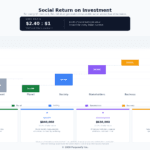Only 41% of Global Companies Have a Published Climate Transition Plan: EY Report

- Low commitment to transition plans: EY Report Reveals Only 41% of global companies have a published transition plan, highlighting a critical gap in climate action.
- Limited long-term goals: Just over half (51%) of companies have set emission reduction targets beyond 2030, suggesting insufficient commitment.
- Underreporting financial impacts: Only 36% of companies reference climate-related risks in financial statements, despite 67% performing scenario analysis.
The 2024 EY Global Climate Action Barometer reveals that while climate disclosures have improved significantly over recent years, urgent action remains lacking among companies to combat the intensifying climate crisis. Despite an increase in disclosure coverage to 94% and a quality score of 54%, this growth is not sufficient to align with the global climate agenda.
Climate Transition Planning and Targets The Barometer indicates a concerning disconnect between awareness and action. Although 94% of large companies disclose climate-related information, only 41% have developed a detailed climate transition plan. “Companies cannot afford to overlook the potential financial impact of climate risk on their business over the medium to long term,” the report underscores.
In the report, Dr. Matthew Bell, EY Global Climate Change and Sustainability Services Leader, and Christophe Lumsden, EY Global Climate and Decarbonization Leader said:
“Climate change is the greatest existential threat facing humanity today — although you probably wouldn’t realize this from the climate disclosures of the world’s biggest companies. Most are still not reflecting the physical or transition risks associated with climate change in their financial statements. Neither do many communicate a plan for transitioning to a net-zero economy, with capital and operational expenditures (capex and opex) projections still not in place. The unavoidable takeaway from these omissions is that most companies remain woefully unprepared for the disruption that is upon us.”

Even more worrying is the reluctance of many firms to set long-term greenhouse gas (GHG) emission targets. Just 51% of companies have goals extending beyond 2030, suggesting a lack of commitment to sustained climate action. Moreover, only 24% of surveyed companies have had their targets validated by the Science Based Targets initiative (SBTi), which sets specific timelines for decarbonization aligned with the 2015 Paris Agreement.

Financial Impact Disclosures Although 67% of businesses conduct climate-related scenario analyses, just 36% include climate-related risks in their financial reports. This reluctance may be due to different planning horizons, as many companies financially plan for the short term while climate risks may unfold over decades. However, recent events, such as the 2021 Texas winter storm and California wildfires, demonstrate the financial implications of unpreparedness, with costs reaching billions of dollars.
Sector and Regional Discrepancies The report highlights varied performance across regions and industries. The UK and EU lead with quality disclosure scores of 69% and 60%, respectively, spurred by stringent regulations. In contrast, key emitters like the US, China, and India trail in progress despite accounting for over half of global CO2 emissions.
RELATED ARTICLE: 90% of Business Leaders Believe AI will Positively Influence Sustainability Goals: IBM Survey
Sectors such as energy, insurance, and mining showed improvement, with energy achieving the highest quality score of 59%. However, even these sectors fall short in adopting comprehensive transition plans, with only 43% of energy companies and 36% of insurers having developed such plans.
Six Actions for Change EY suggests six core actions to expedite the sustainability transition:
- Integrate transition planning into the business strategy, focusing on science-based targets for Scope 1, 2, and 3 emissions.
- Incorporate climate risk in financial statements to demonstrate transparency and foresight.
- Use robust data to drive strategic decisions and anticipate climate challenges.
- Allocate sufficient resources to sustainability teams, ensuring strategic alignment.
- Equip board members with expertise in climate risk management and link executive compensation to sustainability performance.
- Pursue cross-sector collaboration, aligning with public sector initiatives and sustainability policies.
Conclusion The Barometer’s findings highlight that despite improved disclosure coverage, substantial work remains. Companies must elevate their climate action plans and adopt a strategic, transparent approach to meet the urgency required by the climate crisis and the goals of the Paris Agreement.
Download The 2024 EY Global Climate Action Barometer
Follow ESG News on LinkedIn








